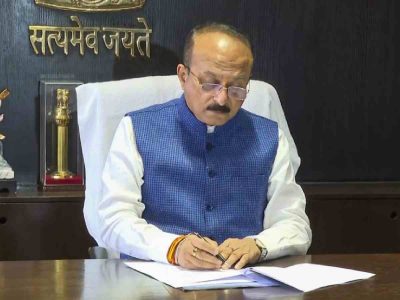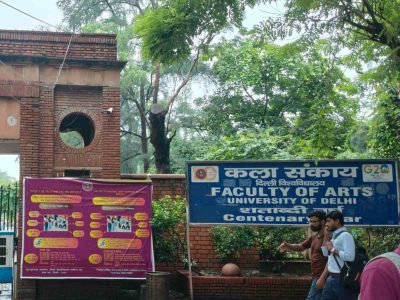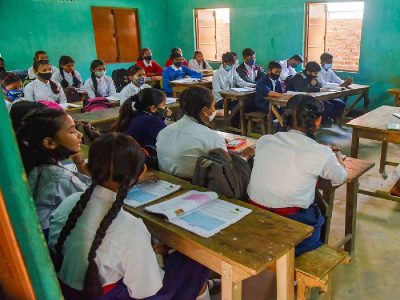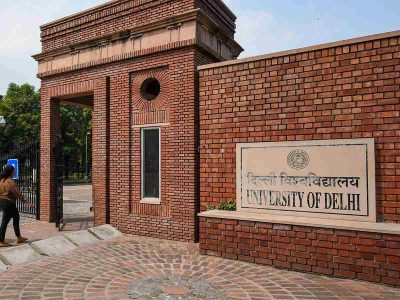Students have allegedly been denied access to washrooms, drinking water, lunch, and even classrooms—all because their parents could not pay hiked school fees. For many families, this has meant mental harassment, humiliation, and desperation.
“My daughters were not even allowed to use the washroom due to the non-payment of the hiked fee,” said Amit Rajput, whose children study at Queen Mary’s School, Tis Hazari. “The school mentally harassed my daughters.”
Speaking to Patriot, Rajput explained that his daughters, in Class 6 and Class 9, were barred from classes at the start of the new academic session (2025–26). “The school administration made them sit in the conference hall and the library the entire day, without allowing them to use the washrooms or eat lunch,” he said.
“After getting to know about the school’s horrific behaviour towards their children, I rushed to the school with my brother Abhishek, but we were not allowed to meet our kids. We made a PCR call. When the police arrived, they entered the school campus, where we found that our child had been sitting in the library since morning, and her attendance hadn’t even been marked,” Rajput added.
When confronted, the school administration claimed it had only happened for “a day.” Rajput also alleged that the administration had repeatedly threatened the family to pay the hiked fees.
‘Tripled fees after Covid, but no salary hikes’
Anita Verma, whose son studies in Class 8 at Queen Mary’s School, Northend, said the burden of fees has become unbearable since the pandemic—even without a home loan or major debt.
“Before Covid, we were paying around Rs 50,000 a year. Now it’s shot up to over Rs 1.35 lakh,” she said. “Jab se Covid ke baad sab kuch ruk gaya, logon ki salaries nahi badhi, lekin school fees teen guna ho gayi.” (Since Covid, everything stalled—salaries didn’t increase, but school fees tripled.)
Her husband lost his private-sector job during the pandemic, forcing the family to survive on Anita’s tutoring income. “At one point, we were struggling just to pay for groceries,” she recalled. Though he’s recently started working again, the income is still unstable.
“We’ve cut everything—vacations, restaurants, clothes—just to pay tuition. But the hidden costs keep coming: books, uniforms, transport, activities,” she said. “It’s exhausting.”
Also Read: Good news for parents! Delhi to regulate private school fees
According to the official fee structure of Queen Mary’s School, the total annual payment for 2024–25 was Rs 1,02,613. In the new session, the increase was over Rs 32,000. In response to mounting protests, the school issued a statement on April 16 denying any harassment and blaming “false narratives.”
Segregated by air conditioning
Across Delhi, schools have introduced separate classrooms based on parents’ ability to pay for air conditioning—splitting children into “AC” and “non-AC” sections.
Sanjeev, a chemical engineer whose two daughters study at Maharaja Agrasen School in Ashok Vihar, said, “Parents are being charged extra for ACs and electricity. Those who don’t pay are shunted to non-AC classrooms.”
“It was only when some parents noticed their children sitting in non-AC rooms that they realised the students already occupying those rooms were primarily from the EWS (Economically Weaker Section) quota. As per government rules, 25% of seats must be reserved for EWS students, and schools are not allowed to charge these students any fees for tuition or facilities. Then, why this partiality with the EWS students?” Sanjeev asserted.
He said the school levies a separate “air conditioning and capital goods investment” charge of Rs 7,500 in cash, while ongoing operational costs are billed separately. “They’ve installed two window ACs per classroom. With 3,500 students, they’re collecting huge sums in cash,” he said.
“However, following the pandemic, the school has increased the fees by nearly 50%, putting a huge burden on the parents. We have also staged several protests, but the school administration and the DoE turned a blind eye towards our complaints,” he added.
‘Fee slip after term starts’: Pushp Vihar parents stunned
Parents of students at Birla Vidya Niketan (BVN) in Pushp Vihar were shocked when the school issued fee slips after the academic year had already begun.
For Class 10, the total annual fee jumped to Rs 1,43,952—an 18% increase from Rs 1,21,800 last year. The development fee alone shot up nearly fourfold, from Rs 3,600 to Rs 14,352.
“As parents, we get that hikes happen, but they can’t be random. There must be transparency,” said a parent, requesting anonymity.
In a circular, the school admitted that during a meeting with the principal, parents raised concerns about the lack of prior notice and the sudden bills uploaded on March 29. The school justified the hike by citing the installation of AC systems in both primary and senior blocks. It later reduced some charges slightly.
Over the past nine years, BVN’s total fees have increased by 98%, and tuition fees alone have nearly doubled—from Rs 55,440 in 2017–18 (Class 2) to Rs 1,10,400 in 2025 (Class 10).
Another parent, Amit Khanna, said, “Even if you factor in equipment, wiring, and labour, Rs 12 crore seems inflated. Should students really be funding capital projects like this?”
Condemning the “unprecedented” hike in fees by schools, Aprajita Gautam, the president of the Delhi Parents Association (DPA), said the steep increase in school fees has deepened the hardships of parents, who are already grappling with rising financial expenses.
Gautam said, “Some schools have raised their fees by as much as 90%, creating an unbearable financial burden for parents. It has become extremely difficult for families to provide their children with quality education in Delhi. Sadly, many schools seem to have transformed into money-making enterprises rather than institutions committed to imparting education.”
Gautam also criticised the (DoE) for its “inaction” on the matter. She added that despite receiving multiple complaints from aggrieved parents, the DoE has failed to intervene or take any substantial action against the private schools that are indulging in illegal fee hikes. “The DoE has effectively turned a blind eye to the plight of the parents,” she said. “Its indifference has left thousands of families feeling helpless and abandoned.”
The DPA president urged the authorities to take immediate steps to regulate school fees and ensure that education remains accessible and affordable to all sections of society.
A legal loophole sparks a fee hike frenzy
The flashpoint came in April 2024, when the Delhi High Court issued an interim order staying a government directive that required schools on subsidised land to seek prior approval before raising fees.
Justice C Hari Shankar ruled that under Section 17(3) of the Delhi School Education Act and Rules (DSEAR), 1973, schools only need to file a fee statement. The ruling drastically weakened the DoE’s oversight, reducing it to monitoring for profiteering or illegal capitation fees.
Suddenly, 390 private schools operating on government-allotted Delhi Development Authority (DDA) land—out of 1,677 total—could raise fees without permission. When the new academic year began, hikes of 10% to 45% were reported across the board.
Children punished for parents’ protests
At Delhi Public School (DPS) Dwarka, matters turned grim. Following steep hikes, annual fees hit Rs 1.4 lakh. Between 2020 and 2025, the school raised tuition fees by 20%, 13%, 9%, 8%, and 7% each year.
In March, parents accused the school of retaliating against students whose families were protesting. Reports emerged of children being isolated in libraries, banned from the canteen, and prevented from interacting with classmates.
These allegations were later confirmed by an eight-member inspection committee led by District Magistrate (Southwest) Lakshay Singhal. On April 16, the Delhi High Court warned the school against operating as a “money-making machine” and ordered that no student be punished over fee disputes.
Political storm brews over school fees
What started as a classroom controversy has erupted into a full-blown political clash between Delhi’s new BJP government and the Aam Aadmi Party (AAP).
Education Minister Ashish Sood claimed his government was the first to establish a legal mechanism against fee hikes. He announced a comprehensive audit of all 1,677 private schools through SDM-led teams, criticising the AAP for auditing only about 75 schools per year.
AAP leaders hit back. Saurabh Bharadwaj accused the BJP of not appointing auditors at all. Meanwhile, senior AAP figure Atishi alleged that Chief Minister Rekha Gupta was “colluding with private school managements.”
In its defence, DPS Dwarka issued a statement dismissing the allegations. The school argued that the fee increases were justified by factors such as compliance with the VII Central Pay Commission’s guidelines, rising operational costs, government levies, and other statutory expenses. It branded public criticism as “false and frivolous.”
Why schools say hikes are ‘essential’
A principal at one private school told Patriot that a 10% annual hike was “non-negotiable.” She explained: “The CBSE keeps introducing new subjects like robotics and carpentry. We need expert trainers, new labs, and even training for our teachers.”
She also defended the rising salaries: “Fees don’t just pay teacher salaries. They cover retirement benefits, allowances, and professional development. We must stay competitive to attract good educators.”
Another principal added that even without large infrastructure projects, running costs like AC upkeep and electricity bills have surged. “Between 2016 and 2021, the DoE didn’t approve any hikes, even though salaries increased by 10% annually,” she said.
Under Section 17(3) of DSEAR, schools must submit proposed fee statements by March 31 each year. Under Section 180, they must also file audited balance sheets by July 31.
“There’s typically a delay of one to two years in responding to schools’ fee hike proposals,” a senior official from the Delhi Education Department said.
Crackdown begins, but parents remain wary
The DoE has started cracking down. In the past week, it issued show-cause notices to at least 11 schools accused of unjustified hikes.
Sources said the following schools have been issued notices: Arwachin Bharti Bhawan Senior Secondary School (Vivek Vihar), The Srijan School, Queen Mary’s School, Guru Tegh Bahadur Public School (Model Town), Mira Model School (Janakpuri), Lancer’s Convent (Rohini), Saroj Montessori School (Vivek Vihar), Geeta Bal Bharti Senior Secondary School (Seelampur), Greenland Public School (Vikas Nagar), St Gregorios School (Dwarka), and Puneet Public School (Vishwas Nagar).
But despite the notices, the fear among parents has not subsided.
The Delhi Cabinet has approved a bill to regulate fees in private schools, promising relief to parents from arbitrary hikes. The Delhi School Education Transparency in Fixation and Regulation of Fees Bill, 2025, will penalise violators with fines ranging from Rs 1 lakh to Rs 10 lakh. A fee hike will only be permitted once in three years, based on 18 parameters, the bill states. It is expected to be tabled in a special Assembly session.





